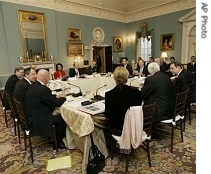-
(单词翻译:双击或拖选)
State Department
02 February 2007
The international diplomatic "Quartet" on the Middle East Friday endorsed1 an upcoming three-way U.S., Palestinian and Israeli meeting aimed at reopening discussion of final-status issues of the peace process. But Quartet principals disagreed openly on the wisdom of direct dialogue with Syria and the radical2 Palestinian movement Hamas. VOA's David Gollust reports from the State Department.
 |
| Secretary of State Condoleezza Rice, back row in red suit, hosts meeting of the Mideast Quartet, at the State Department in Washington |
But there was open disagreement among the partners about the means to renew the stalled regional peace process, with Russian Foreign Minister Sergei Lavrov making clear his view that Syria should not be excluded from the dialogue.
The United States has shunned5 high-level contacts with Syria for nearly four years because of what U.S. officials say is its support for Palestinian radicals6, including Hamas, and continued meddling7 in Lebanon, among other things.
But at a joint news conference capping the Quartet meeting, Lavrov defended Moscow's contacts with both Syria and Hamas, which the Quartet has excluded from peacemaking because of its refusal to accept Israel's right to exist.
Lavrov said Russian diplomacy8 with Syria helped produce a recent meeting between Palestinian Authority chief Mahmoud Abbas and the Syrian-based Hamas leader Khaled Meshaal, which in turn led to the recent intra-Palestinian truce9 accord.
Heard through an interpreter, Lavrov said, to exclude significant parties from Mideast peace efforts generally is counter-productive:
"When we're talking about not only the resolution of the Palestinian-Israeli conflict, but about the resolution of various problems in the Middle East, be it Lebanon, or Syria or the Iraqi problems, we believe that it is counter-productive to isolate10 anybody," he said. "And, we believe that to involve all those who could influence the situation is extremely necessary, so that this contribution or influence would be positive, not negative."
Rice defended the U.S. approach toward Syria, saying it had not cut off all contact with the Damascus government, which - she asserted - is in no doubt about what it needs to do to be a positive factor in the region:
"Syria doesn't need the United States to tell it what it could do to be a stabilizing11 force," she noted12. "And I hope that [Syria] will, in fact, try to play a positive role rather than a negative one. The United States has diplomatic relations with Syria, has on many occasions talked to Syria, even at the highest levels. But we believe at this point in time that it is for Syria to act on what is a very obvious, what would be a very obvious path to help stabilize13 the region."
German Foreign Minister Frank-Walter Steinmeier, whose government currently holds the rotating EU presidency14, seemed to take a middle ground. Steinmeier, who visited Damascus in December, said he had done so to directly convey to Syrian leaders European concerns about its behavior. He is also heard through an interpreter:
"We are working for a comprehensive peace solution in the Middle East, and that means we will have to engage other partners, beyond Israel and Palestine," he explained. "And I think, we share the view that Syria itself has to make it clear that it is willing to constructively15 engage in this peace process, and this is what I tried to impress upon the parties involved during my visit in Damascus."
Steinmeier said the Quartet partners agreed to convene16 again soon, after the Rice meeting with Mr. Abbas and Israeli Prime Minister Ehud Olmert, to be held sometime during the middle of this month at a still undisclosed Middle East venue17.
The Quartet statement welcomed the Rice initiative, which it said could help define more clearly the "political horizon" for the Palestinian people, and help engender18 a sense of partnership19 between the parties.
Rice proposes to have an informal discussion with the two leaders on the so-called "final status" issues of the peace process, such as borders for a Palestinian state, refugees and the status of Jerusalem.
The Secretary says the talks, the first of their kind in six years, would complement20 but not replace the Quartet's road map to a two-state Middle East settlement, issued in 2003, but still largely unfulfilled.
 收听单词发音
收听单词发音
1
endorsed

|
|
| vt.& vi.endorse的过去式或过去分词形式v.赞同( endorse的过去式和过去分词 );在(尤指支票的)背面签字;在(文件的)背面写评论;在广告上说本人使用并赞同某产品 | |
参考例句: |
|
|
|
2
radical

|
|
| n.激进份子,原子团,根号;adj.根本的,激进的,彻底的 | |
参考例句: |
|
|
|
3
condemnation

|
|
| n.谴责; 定罪 | |
参考例句: |
|
|
|
4
joint

|
|
| adj.联合的,共同的;n.关节,接合处;v.连接,贴合 | |
参考例句: |
|
|
|
5
shunned

|
|
| v.避开,回避,避免( shun的过去式和过去分词 ) | |
参考例句: |
|
|
|
6
radicals

|
|
| n.激进分子( radical的名词复数 );根基;基本原理;[数学]根数 | |
参考例句: |
|
|
|
7
meddling

|
|
| v.干涉,干预(他人事务)( meddle的现在分词 ) | |
参考例句: |
|
|
|
8
diplomacy

|
|
| n.外交;外交手腕,交际手腕 | |
参考例句: |
|
|
|
9
truce

|
|
| n.休战,(争执,烦恼等的)缓和;v.以停战结束 | |
参考例句: |
|
|
|
10
isolate

|
|
| vt.使孤立,隔离 | |
参考例句: |
|
|
|
11
stabilizing

|
|
| n.稳定化处理[退火]v.(使)稳定, (使)稳固( stabilize的现在分词 ) | |
参考例句: |
|
|
|
12
noted

|
|
| adj.著名的,知名的 | |
参考例句: |
|
|
|
13
stabilize

|
|
| vt.(使)稳定,使稳固,使稳定平衡;vi.稳定 | |
参考例句: |
|
|
|
14
presidency

|
|
| n.总统(校长,总经理)的职位(任期) | |
参考例句: |
|
|
|
15
constructively

|
|
| ad.有益的,积极的 | |
参考例句: |
|
|
|
16
convene

|
|
| v.集合,召集,召唤,聚集,集合 | |
参考例句: |
|
|
|
17
venue

|
|
| n.犯罪地点,审判地,管辖地,发生地点,集合地点 | |
参考例句: |
|
|
|
18
engender

|
|
| v.产生,引起 | |
参考例句: |
|
|
|
19
partnership

|
|
| n.合作关系,伙伴关系 | |
参考例句: |
|
|
|
20
complement

|
|
| n.补足物,船上的定员;补语;vt.补充,补足 | |
参考例句: |
|
|
|















